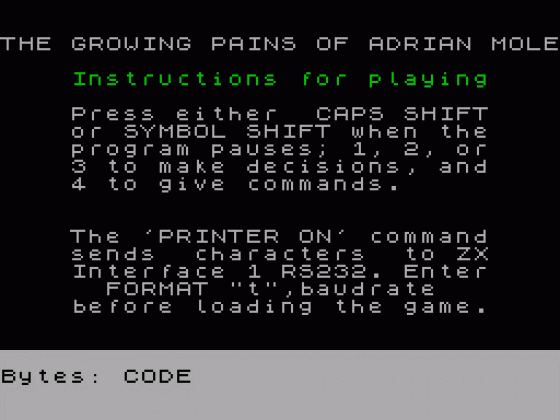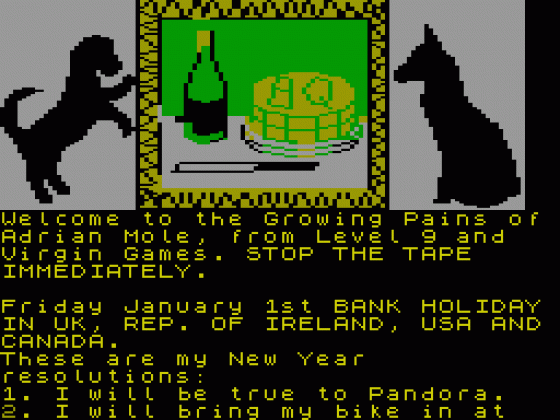
ZX Computing
 1st April 1987
1st April 1987
Categories: Review: Software
Publisher: Virgin Games
Machine: Spectrum 48K/128K
Published in ZX Computing #36
The Growing Pains of Adrian Mole
Like the first Mole game (published some time ago), this has been programmed by Level 9 and is in a very similar style (the one also used for The Archers). Just in case you've been spending the past few years with your head in a bucket, Adrian Mole is an angst-ridden teenager wh thinks he's a trendy intellectual (in fact, he's naive and, frankly, square), has squabbling, unemployed parents and loves precocious Pandora. The phenomenally successful books (which spawned high-rating television series) were in diary format (which the game retains). The Growing Pains sees Adrian with 'O' Levels approaching, and is set around 1982-3, the time of the Falklands war.
The game is in four loads, each dealing with several months of Ade's life. Excerpts from his diary scroll up (there are some graphics, but they're wel down to Level 9's abominable standard, abtract beyond belief and best turned off) until, after certain situations, you must choose one of three options as to what Adrian can do. This may well have the effect of causing more options to appear, as a whole sub-plot is pursued. The aim is to make Adrian as popular as possible (there's a percentage score and a rating); or you could try to do the opposite!
I don't think you'll understand this game if you know nothing about Adrian Mole, as there's no explanation in the instructions about who the characters you'll encounter are. You don't have to be a Mole fanatic to appreciate the game though; I'm certainly not, yet I enjoyed it.

I think fans of the book will enjoy the game due to the chance to make Adrian act differently from the way he does on page. However, this means programmer Pete Austin has had to add totally new situations (the results of different choices); unfortunately some of these are not at all in the style of the book. What really annoyed me was his total disregard for the book's scrupulous period setting (it is a diary, after all). I wasn't very far from Adrian's age in 1982, so I was quite nostalgic at Sue Townsend's references to events such as the start of breakfast television (setting the alarm extra early!). Then it's ruined with a reference to Dirty Den (EastEnders began in 1985 for goodness sake!); or giving the option to see Jaws or Superman at the cinema (both were films of the seventies that wouldn't have been playing in 1982). Mr. Austin should have done what all good authors do - research what he's writing about. I was also puzzled at some of the changes he made to Sue Townsend's original text. While tight memory obviously prevents the computer verion being identical, in some instances Pete Austin has changed little detail - like who said what, ot a person's reactions - yet not made the diary entry noticeably shorter. Why? What gives Mr. Austin the right to tamper with what many feel is a modern classic?
As I just hinted, the major problem with the transition from book to game is that due to memory restrictions, the text is severely pruned. This means many of the little observations are lost, along with much of the detail (such as letters); yet it was this detail which I liked so much with the book. You could read the book while playing the game, but that seems a pointless exercise. I can't help feeling this project should never have been attempted on cassette - disc should have been used (even if a Spectrum version was thus made impossible) and the complete book transferred.
One of the problems with The Archers' game was contradicting storylines - a character you had sent away would immediately reappear. This doesn't happen with Adrian Mole, mostly because few of the decisions are of long term importance. If this game was more sophisticated, one decision could utterly alter the rest of the adventure, parts of the plot being made completely unfeasible. Again, a possibility if disc had been used.
As with The Archers, Growing Pains has questionable durability, since after playing several times you'll have seen all it has to offer. The game is a fun extension of the books, and should offer some entertainment. But I feel that because it was impossible to do full justice to the original text (i.e. print it all), the project should not have been attempted.
Other Reviews Of The Growing Pains Of Adrian Mole For The Spectrum 48K/128K
The Growing Pains Of Adrian Mole (Virgin)
A review
The Growing Pains Of Adrian Mole (Ricochet)
A review by Phil King (Crash)
The Growing Pains Of Adrian Mole (Virgin)
A review by Graham Taylor (Sinclair User)
Growing Pains Of Adrian Mole (Virgin Games)
A review


